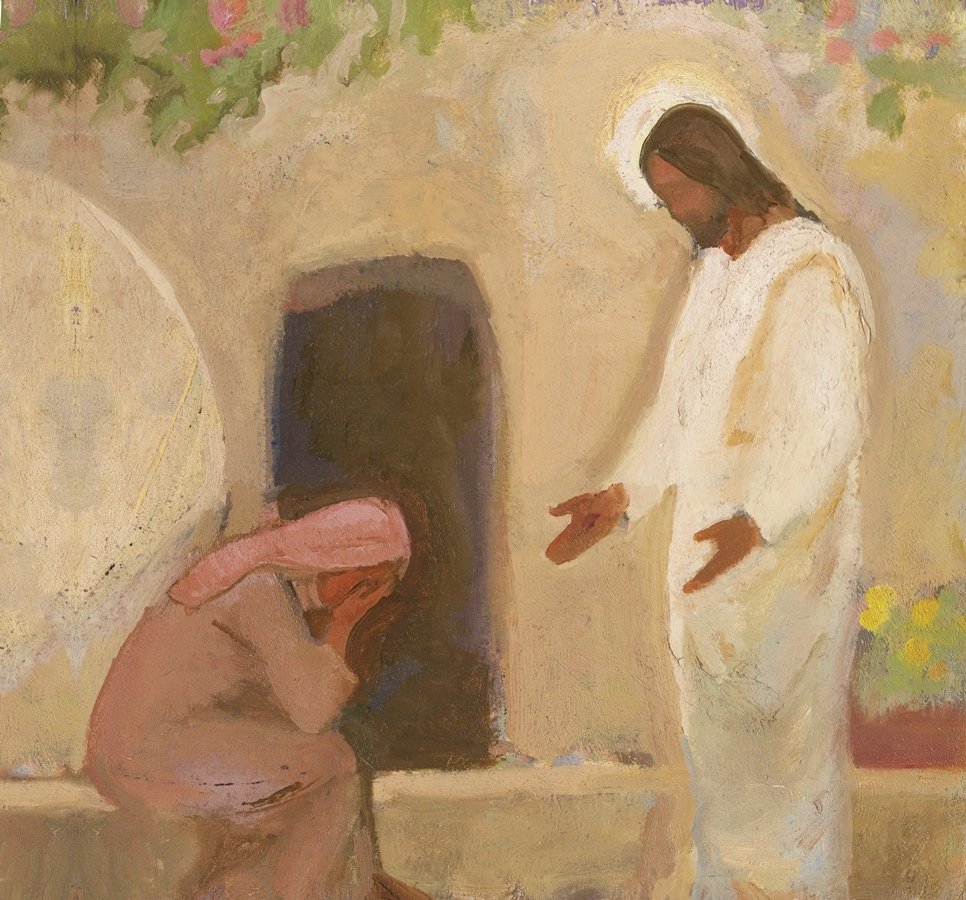Did Not Our Hearts Burn Within Us?
I’ve been wondering, recently, why no one recognized Jesus when He came back from the dead. Why did no one, upon simply seeing Jesus, shout or faint or otherwise realize that he was flesh and bone among them again.
We can give Mary some room. Mary went to finish Jesus’s burial only to find his body missing, two angels chilling exactly where it should have been. Mary turned and saw Jesus but, through her tears and confusion, didn’t recognize him until he said her name. But she was crying, she’d just encountered angels, she’d though He was dead, and it had been a really, really rough week. We can give Mary some room.
By J. Kirk Richards
Peter and the disciples on the boat are slightly less understandable. Peter and seven other disciples responded to the overwhelming flurry of events with familiarity (something I resonate with enormously): they went fishing (something I resonate with less). After an entire night without a single fish, a man called from the shore enquiring after their success. He suggested throwing the net over the other side, and at this point Peter had to be thinking about the last time this happened—the last time he’d spent a sleepless night rocking in a boat without a single moment of success, the last time some know-it-all from the shore giving out free advice. The last time was the first time He’d met His Lord.
So when, just like the last time, the net came in overflowing, Peter jumped the boat to swim to shore. Say what you want about Peter, but he took every shot he ever got to be close to Jesus.
Why didn’t they recognize Him sooner? He wasn’t that far away—something like 45 feet, according to the scriptures, and they already knew that Jesus wasn’t in that cold dark tomb, but risen. Still, no one recognized their Lord until it was veering on painfully obvious. Even when they got to land (the rest of them very sensibly paddling in), even as they pulled their overflowing skiff up the sand, they still had to ask, “Who are you?” because they weren’t sure they trusted their eyes.
It’s the disciples on the road to Emmaus, though, where this trend becomes ridiculous. Jesus right walked up to them. He asked them questions about themselves and taught them. It wasn’t until they broke bread together at an inn and Jesus blessed it, as He’d done the last time they saw Him, that they recognized Him. As soon as they recognized Him, He disappeared. (Why??? Was He just really enjoying His Huck-Finn-at-his-own-funeral moment?)
The disciples sat there, the bread in front of them, staring at each other in a tiny little inn in a tiny little village, and they said, “How did we not known it was Him? How could we have possibly not recognized Him?”
It’s a very good question. Luke says they “were kept from recognizing him” (Luke 24:15), but what does that mean? How and, more pressingly, why were they kept from recognizing the greatest of all breathing miracles right in front of them?
I have a theory. It’s only one, and I love the Jewish practice of Havruta, so if you really want to make my day, propose another answer in the comments. Here’s my idea: these disciples were nigh unto spoiled, in that they had walked with the living God. They’d watched Him place His hands on people and heal, to multiply food, to walk on water. They’d been there for His miracles, and they knew what it was to be with Him in the flesh. This was both an incredible, sustaining privilege and something of a handicap, because they didn’t have as much experience in what it felt like to be with Jesus when they couldn’t see Him. They were about to embark on one of the most epic of all stories, to bring Jesus’s words across continents and, eventually, the world. They were going to perform miracles themselves, and they couldn’t do that without knowing that Jesus was with them. They weren’t going to be able to see Him, so they were going to have to find some other way of recognizing Him.
“Did not our hearts burn within us?” the disciples asked each other (Luke 24:32). None of them recognized Him by seeing Him, but He gave all of them tools to know Him: Mary He called by her name; the disciples felt their hearts swell; and Peter, darling Peter, he experienced some of the Lord’s perfect parallelism.
I get jealous of the New Testament folks sometimes, despite all of the eventual martyrdom. I wish I could have been there to kneel at Jesus’s feet, to listen to Him speak and wonder what He meant. I want to know what His laugh sounded like, how He talked about his siblings, if He spoke softly to children or played with them raucously or both. But even though Mary and Peter and the rest of the disciples got to know these parts of Jesus, they still had to come to know Him the way I do. They had to recognize their hearts burning, their names in His mouth, the symmetry that signals His storytelling. Just like us, that had to tide them over until they got to kneel at His feet once again.
